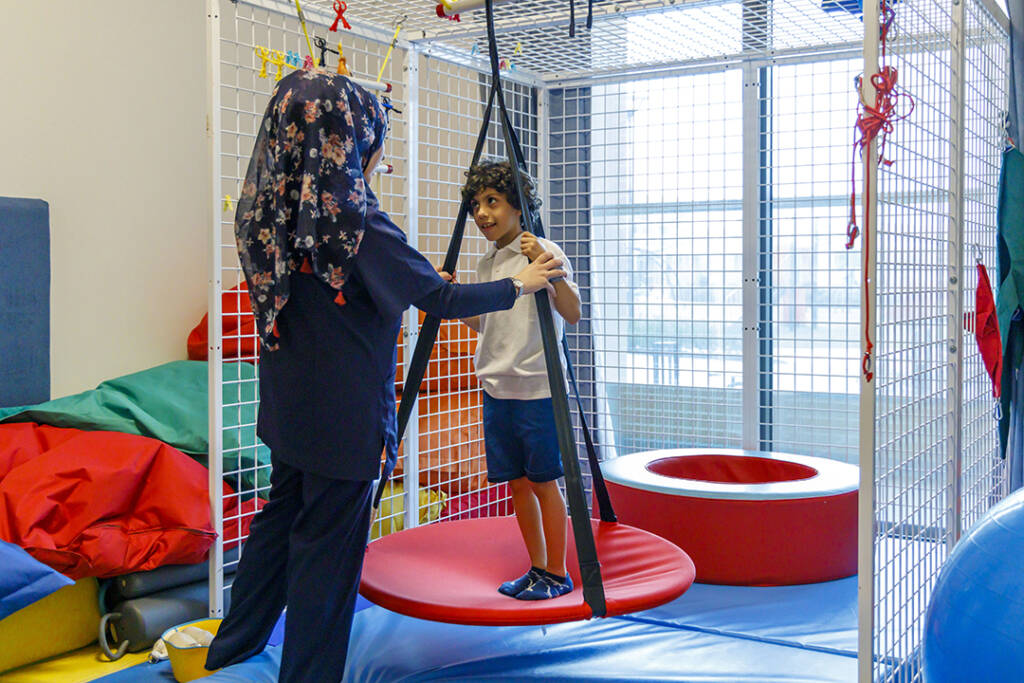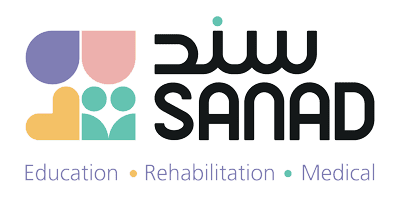
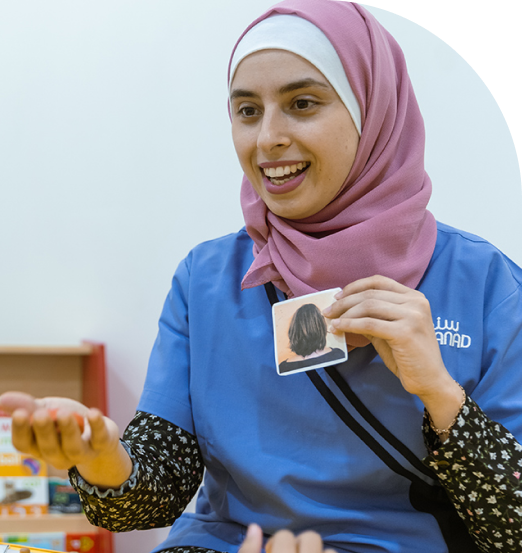

Overview
At Sanad Village, we offer multiple different 1:1 intensive therapy by highly skilled, qualified therapists licensed by the Dubai Health Authority. Sanad Village is equipped with T – Rooms which are used for 1:1 session from speech and OT, each room fully equipped with educational tools which we use in our sessions. In addition to the room, we are using our facility also to provide treatment for clients such as using Zoom to work on communication skills.
Speech and Language Therapy:
Speech and Language Therapy (SLT) is the assessment and treatment of communication struggles and speech disorders. At Sanad Village, our team of highly-trained speech and language therapists work with individuals with multiple types of disorders to improve their verbal, nonverbal and social communication skills and develop the skills they need to interact with others and succeed in school and in life. Our therapists are trained to deal with various cases such as:
- Language Disorder and Delays
- Autism Spectrum Disorder
- Speech Impairments
- Stuttering
- Articulation Disorders
- Delayed Social Skills
- Dysphagia and Dysarthria
- Vocal Disorder
- Sensory Feeding Disorder
- Down Syndrome
- Cerebral Palsy
- Social Communication Disorder
- Genetic Disorder
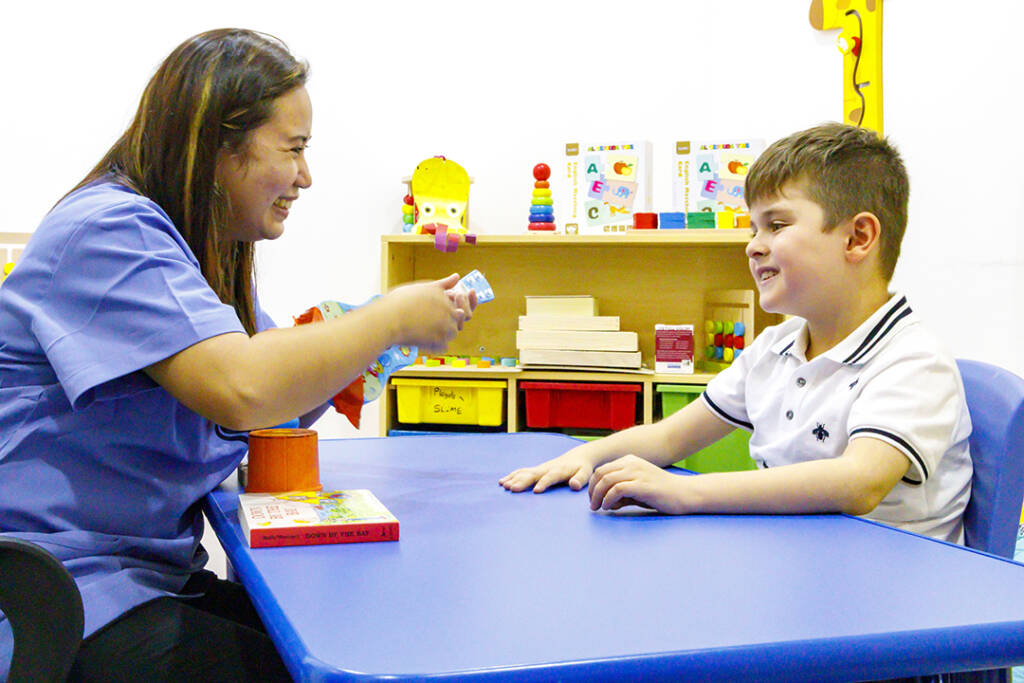
Our therapists work with children of all ages (infants, toddlers, preschoolers, school-age children and young adults). Sessions are individualized to meet the unique needs of each individual. We use evidence-based approaches and techniques that have been shown to be effective in improving communication skills in individuals. These include:
Augmentative and Alternative Communication (AAC)
AAC includes methods of communication that supplement or replace spoken language, such as sign language, picture communication systems, and electronic communication devices.
Social Communication Intervention:
This approach focuses on improving social communication skills, such as understanding social cues and taking turns during conversations.
Articulation therapy:
This technique helps children learn how to pronounce words correctly by focusing on the placement of their tongue, lips, and jaw.
Language intervention therapy:
This technique focuses on developing a child’s ability to understand and use language through activities such as conversation, storytelling, and games.
Language development:
We help individuals with autism develop their language skills, including vocabulary, grammar, and comprehension, through structured activities and play-based learning.


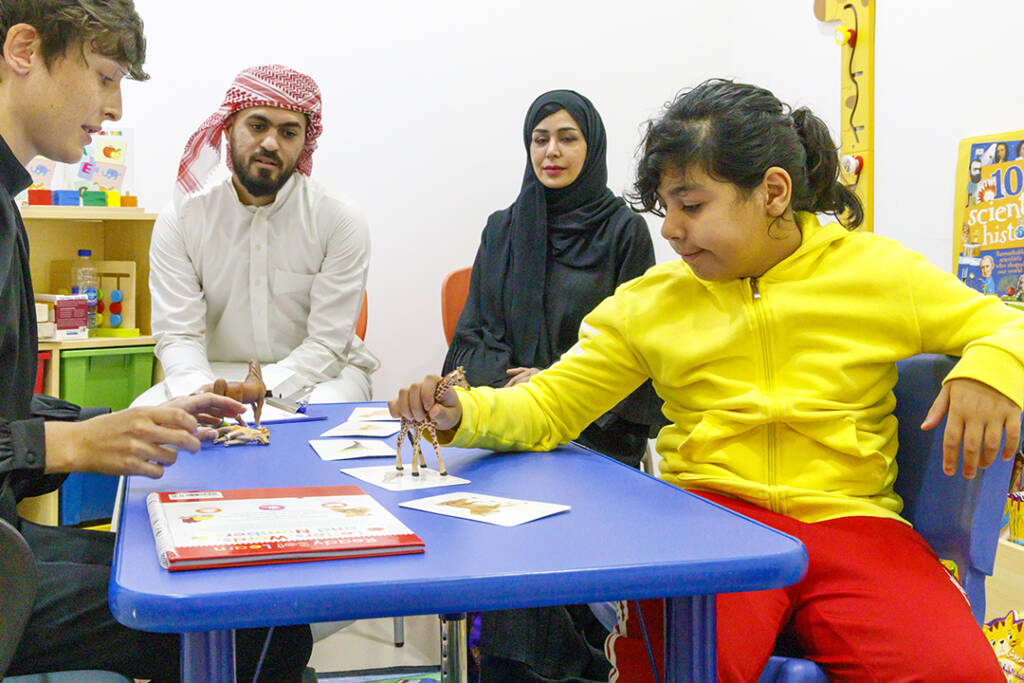

Occupational Therapy
Occupational therapy is a type of therapy that focuses on helping children develop the skills they need to perform everyday tasks, such as getting dressed, eating, and playing with toys. For children with developmental disorders, occupational therapy can be particularly beneficial to help them develop skills related to social interaction, sensory processing, and motor coordination.
Our team of highly skilled and trained occupational therapists at Sanad Village work with children and families to develop individualized treatment plans that address their unique needs and goals. We use a variety of techniques and interventions to help children build skills and reach their full potential.
Some of the areas that occupational therapy can address for children with autism and other related conditions include:
- Sensory processing: Children with autism may have difficulty processing sensory information, which can affect their ability to engage in daily activities. Occupational therapy can help children develop strategies for processing sensory information and improving their overall sensory regulation.
- Fine motor skills: The use of small muscles in the hands and fingers, and are important for tasks such as writing, drawing, and manipulating small objects. Occupational therapy can help children develop fine motor skills and improve their ability to perform these tasks.
- Gross motor skills: The use of large muscles in the body, such as those used for walking, running, and jumping. Occupational therapy can help children develop gross motor skills and improve their overall coordination.
- Activities of daily living: Activities of daily living, or ADLs, are the tasks that we perform each day to take care of ourselves, such as getting dressed, brushing our teeth, and eating. Occupational therapy can help children develop the skills they need to perform these tasks independently.
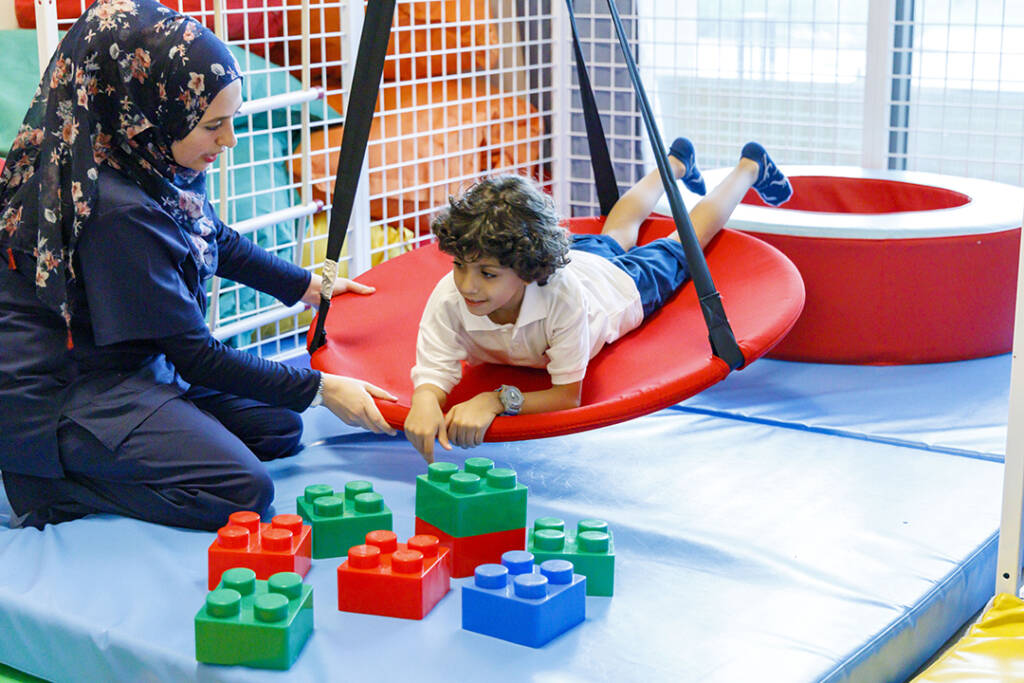
Sensory Gym
It is primarily carried out by occupational therapists since they are using sensory integration theory which provides the clients with different types of sensory input to target the central nervous system and teach the brain how to react and interact with the environment in order to improve their quality of life and independence. In addition, it can be used by speech therapists as many studies have linked motor activities with communication skills. As you can see, it also has physiotherapy tools for them to utilize.
Physiotherapy
Physiotherapy is a type of therapy that focuses on improving physical function, mobility, and strength. For children of various developmental disorder such as Autism or Cerebral Palsy, physiotherapy can be particularly beneficial because it can help improve their overall physical health and well-being, as well as their ability to engage in daily activities.
Our physiotherapists work with children and families to develop individualized treatment plans that address their unique needs and goals. We use a variety of techniques and interventions to help children build strength, improve mobility, and achieve their full physical potential.
Some of the areas that physiotherapy can address for children with autism include:
- Gross motor skills: Gross motor skills involve using larger muscles in the body, such as those used for walking, running, and jumping. Physiotherapy can help children with autism develop gross motor skills and improve their overall coordination and balance.
- Posture and alignment: Children with autism may have difficulties with posture and alignment, which can lead to pain and discomfort. Physiotherapy can help children improve their posture and alignment, reducing pain and improving overall physical function.
- Range of motion: Range of motion refers to the movement of joints and muscles. Children with autism may have limited range of motion, which can affect their ability to perform daily activities. Physiotherapy can help improve range of motion and increase flexibility.
- Pain management: Children with autism may have difficulties with pain management, which can affect their ability to engage in daily activities. Physiotherapy can help children develop strategies for managing pain and improving overall physical function.
- Endurance: Involves gradually increasing the amount of time and intensity of physical activity to improve cardiovascular and muscular endurance.
- Strength: Involves a gradual and progressive approach that focuses on improving muscle strength and function.
